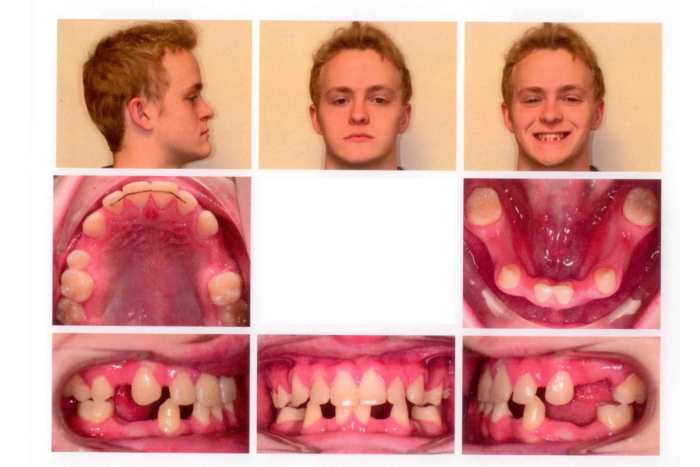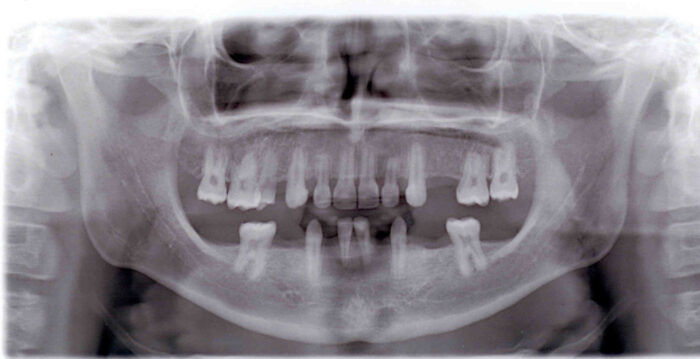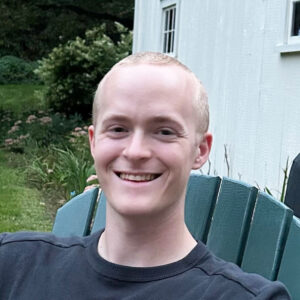By Soren Roe
A fun fact about myself (but really, not that fun) – I was born without 13 adult teeth. My mom recalls breaking down in the dentist’s office when she first heard this, which is the product of an undefined ectodermal dysplasia.
My sister shares this condition which was likely inherited from our father – while my twin brother luckily does not. As you can imagine, the toll has been immense both emotionally and financially for our family. For most of my life, I’ve resented having this ectodermal dysplasia and struggled to come to terms with my journey — a journey which I acknowledge is certainly a privileged one.
I’ve been beyond fortunate to receive world-class dental care and now, a great set of teeth. Even so, I feel the need to share my story not only for my own progress in this journey, but to provide company to those who also share these experiences.

Struggling to Cope With Missing Teeth
My lack of teeth is something that I struggled with for many years for both practical reasons and for my self-esteem. There were many ways I would try to hide this fact, such as smiling with my mouth closed (a habit I still carry to this day). I had trouble eating certain foods, and, most disappointingly, I was unable to bite into apples for years.
Even in baseball dugouts which were the place I felt the most comfortable as a kid, I would refrain from eating snacks no matter how hungry I was because I didn’t want my teammates to see me take my Invisalign (with my false teeth) out. These may seem minor to some, but it always made me feel that I was not like everyone else.
The most extreme example for me, was when I was 18 and just beginning to date my now girlfriend. Before our official first date, I vividly remember explaining to my mom that no matter how much she liked me, it wouldn’t matter once she realized my condition. To my surprise (but not my mom’s), when I took my retainer out at dinner that night, she didn’t care at all, and the rest of the date went very well.
Join Soren Roe and NFED Board President Karl Nelsen when they lead the ELSA Walk to the Capitol Building in Washington D.C. on Sunday, September 17. The event will kick off our NFED Advocacy Day on Capitol Hill on Tuesday, September 19. If you are not in the D.C. area, you can walk virtually, too. Soren and Karl will be livestreaming their walk on Facebook. Together, we can raise awareness for the Ensuring Lasting Smiles Act! Learn more.
Feeling Alone and Fearful
Thankfully, now it’s easy for me to recognize that these fears were overdone, but it goes to show how significant something like ectodermal dysplasia can be on ones’ self-perception. My lack of teeth was and still is a centrally defining part of myself and my personal experiences. This perception has made it difficult to contextualize my internal perception versus others’ perception of me.
Part of what has made this challenging is how isolating ectodermal dysplasia can be since, beyond my sister, I never knew anyone who had this condition. I’ve often thought about how many hours more than the average person I’ve spent at the dentists’ office over the years. I’ve thought about all the times I’ve laid in a reclinable chair with a glaring light just above my face, with my mouth stretched open far too wide; so much time that I’ve (frighteningly) come to memorize the different ceiling patterns of the offices where I’ve been a patient.

I also recognize the intense fear I have developed for the high-pitched whirl of one of the devices used to polish and shape my molded teeth, which every so often would shoot severe flashes of pain throughout my body. Or that particularly invasive feeling when the icy liquid of the IV would enter my veins before one of my many jaw surgeries.
Realizing My Resentment about Being Born Without Teeth
When I sum up all these experiences, I see how ectodermal dysplasia has shaped me. Until I started writing this, I didn’t realize how little I’ve truly appreciated this fact. Throughout my life, I’ve essentially compartmentalized these experiences as nothing more than a means to an end, and in doing so I created a sense of resentment over the fact that I’ve had to fight for a normal set of teeth when others haven’t. But is it a means to an end? I don’t think so – at least in terms of my teeth and experiences.
What I now truly understand is that this journey has formed who I am and how I look at the world, and for that I’m incredibly grateful.
No one should have to deal with ectodermal dysplasia, and no one should have to spend their formative years wishing that they could have normal teeth, skin, or hair. It is inherently unfair that something so uncontrollable can become such an obstacle to quality of life. But this unfairness is precisely why I’ve come to truly appreciate my condition – because it has empowered me to realize my strengths and truly assess what I am capable of. There are few things in my life that have impacted me in such a way, and I am undoubtedly better off because of it.
A New Opening Line
The very first line of this story is one that I’ve found myself using quite often when I meet new people now. I’ll mention that I was born without 13 teeth, and they’ll respond “What?! I would’ve never guessed!” I’ll explain that I have many implants and had a lot of other surgeries, and the person will usually struggle to identify which teeth are my natural ones and which ones are not.
It’s a fun way to share something personal about myself and will often encourage them to share something personal as well. People seem to genuinely appreciate hearing about my story and are often interested in learning about ectodermal dysplasia. It’s genuinely liberating to finally allow myself to become my own advocate – something that I hope to become for many others as well.
Soren Roe is a guest blogger for the National Foundation for Ectodermal Dysplasias. He lives in New York City and is affected by an unknown type of ectodermal dysplasia..

This article really struck a cord with me as we have an 18 year old who is in this situation and we are struggling to make the right decision in moving forward with his dental work. Years of orthodontics, now hearing if he can or cannot get implants due to bone structure. I would love to talk to Soren or his mom to know what course they decided on. We are being told some areas cannot have implants and I’m not sure what the right choice is but our son is 18 so we need to move forward.
Hi, Tracy: If it is ok with you, we can share your email address with Soren. I would also recommend reaching out to our Director of family and community programs, Kelley, if you have further questions or would like a recommendation for a dental treatment center. Her email is kelley@nfed.org. Let me know if you are OK with us sharing your email address.
Thanks,
Veronica
Hello and thanks for sharing your story! Like Tracy who commented above, I’d love to learn more about the treatment plan. My child is 12 and about to start orthodontics. There was mention of implants and bone grafting, along with other dental work like bridges. My child’s story is very similar as far as missing several adult teeth and it’s rare to find others who might be able to shed a light on what to expect as we start on the treatment path.
Hi, Bianca! We do offer some resources and guides to dental treatment on our site. This is a good place to start: https://nfed.org/treat/dental-treatment-options/. We realize how costly it is for families, which is why we advocate for the Ensuring Lasting Smiles Act. I would also encourage you to reach out to our director, family and community programs, Kelley, at kelley@nfed.org with further questions.
I would have given anything to be in his situation. ED had me missing ALL of mine. I’m 52 and still have never had a full mouth of teeth. I don’t have access to World Class Dentistry” unless you refer to “Third World Dentistry” as the insurance through my job is pitiful, at best.
I am also in the same boat.. I am 28 years old and I have IP.. I too am missing teeth and have been told about how strange my teeth are and there’s nothing a cosmetic dentist can do.. I’ve dealt with 3 different orthodontist since I was 14. I currently wear retainers on the top & bottom and I don’t know what route to take next. My children also have the unfortunate side of missing teeth.
I have two children that have ectodermal dysplasia. They together have about 10 adult teeth. They have had Medicaid but it will not pay for what they need because Medicaid thinks it’s a cosmetic issue. I would love to know how you got treatments so that I can help my children.
Hi, Lisa! We do offer some resources and guides to dental treatment on our site. This is a good place to start: https://nfed.org/treat/dental-treatment-options/. We realize how costly it is for families, which is why we advocate for the Ensuring Lasting Smiles Act. I would also encourage you to reach out to our director, family and community programs, Kelley, at kelley@nfed.org with further questions.
Hi – beautiful story that I can relate to being in a very similar situation with missing adult teeth. I would love to know what your treatment consisted of (you said many jaw surgeries) and who your dental team consisted of.
My sister and I struggle with a similar issue, however, I have had years of dental treatment and my sister has not. To my disappointment, I am not able to get implants or bridges due to my bone and teeth being too soft. They have told me that my only course of action is to get partial dentures or full dentures. I am missing 9 adult teeth in total, which include 3 molars, my 2 vampire teeth, and 4 bottom front lower teeth. I have had braces twice and probably will have to have them a third time. I am all too familiar with the whirring of the tool that polishes and grinds your teeth down and I remember having to take frequent breaks as my nerve endings had grown into the tips of my teeth. I would cry after every visit I had to have this done because my teeth would be so sensitive for days after. I am 28 now and my sister is 31. Thank you for sharing your story. One day I hope my sister and I will both have our teeth fixed.
Hi Soren,
What a lovely article. Thank you for sharing your story, it so beautifully (and yet so briefly) describes what you have experienced and also how wonderfully positive you are as a person! It’s so interesting to hear different perspectives about the condition, Growing up, my entire extended family (grandpa, aunties, cousins, mum) all had ED (although we didn’t know then that it was a genetic condition) and so missing teeth was a very normal thing for me. In fact, I did not even know that it was ‘normal’ to have all of your teeth – I thought everyone had a few missing. My 17 month old son is affected by ED and I can’t wait to read your story to him one day. Thank you 😊💛
First time I’ve ever read about the condition my son has! Thank you for this information!!
Thank you Soren for sharing your story. I am glad you have found peace with your situation.. it sounds like it has been very challenging!
We have an almost five year old grandson with one tooth and new dentures that were made before the tooth showed up so there is hope but I was trying to imagine wearing dentures myself (59) and I know it is super weird and can understand why he isn’t fond of them. I hope that the work of the NFED org will come to fruition for everyone who has to deal with this orthodontic struggle.
Oh how this story resonates with me. We have a 29 year old son who is affected, several sets of dentures from 3-8 and finally he said he was done and would go without. He only had his two front teeth, 2 sets of molars and a random straggler on the bottom…but was OK UNTIL about 18. Again started our search and the cost was just so expensive and my insurance would not touch UNTIL I had read some documentation from NFED regarding insurance and if your employer was self insured in which they were. Fortunately I had worked with our benefits lady for a long time, she was familiar with my son and his condition and they worked their magic to get approved. We started treatment 1 wk after his 25 birthday (July 2019), told the doc we needed to be done by his next birthday (July 2020), COVID happened…BUT were only 6 months beyond his 26th birthday! First surgery was pretty much all day, 11 teeth pulled and too much bone graph to chart. This kid was fileted top and bottom and NEVER complained! It is amazing what teeth will do for a persons mental/physical well being muchless a gorgeous smile!! He says to this day he would do it again if he had to. Don’t lose hope, ask and pester your benefits people it could pay off in the long run. We are very grateful!!
This article about Soren’s journey from resentment to empowerment touched my heart deeply. His openness about being born without adult teeth and the emotional struggles he faced resonate with me on a personal level. Soren’s courage to share his story and advocate for others with ectodermal dysplasia is truly inspiring. Reading about his realization of gratitude for his experiences despite the challenges he’s endured reminds me of the power of resilience and self-acceptance. Soren’s willingness to embrace his condition and use it as a platform for connection and advocacy is commendable. His story reminds us all that our perceived weaknesses can be transformed into sources of strength and empowerment.
Reading Soren Roe’s story was incredibly moving and eye-opening. His honest account of living with ectodermal dysplasia and being born without 13 adult teeth really helped me understand the emotional and practical challenges he faced. It’s inspiring to see how he’s turned his personal struggles into a source of strength and empowerment. The way he shared his journey—from feeling isolated and self-conscious to finding confidence and advocacy—really highlighted the importance of resilience and self-acceptance. This article did a fantastic job of showing that even difficult experiences can lead to personal growth and understanding. Great job on making such a personal and important story so accessible and impactful!